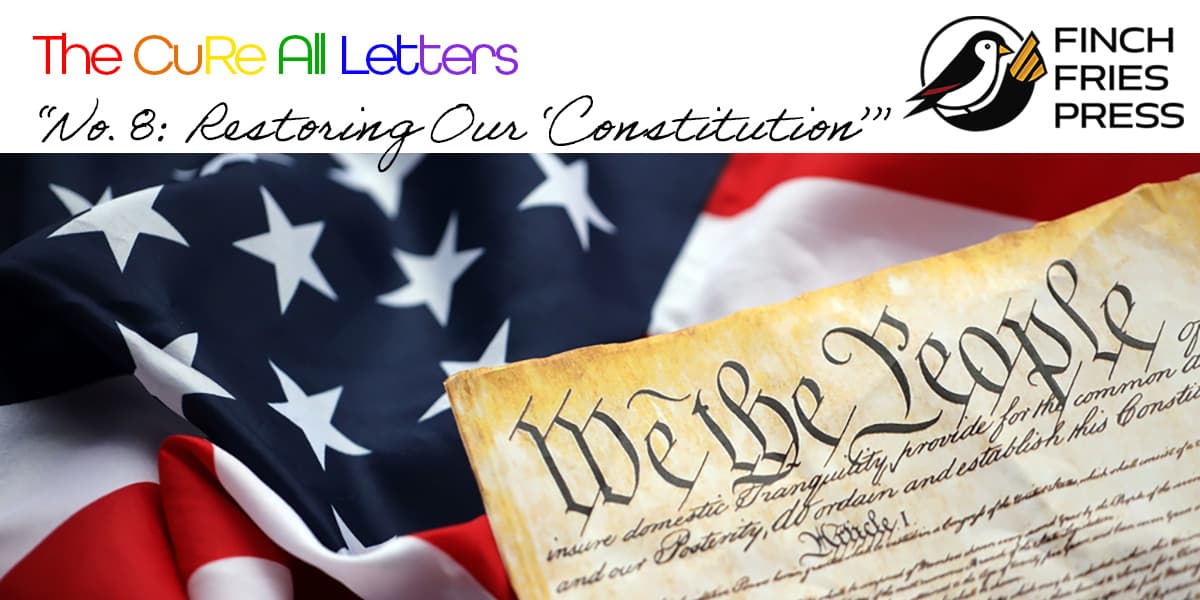Dear America,
Did you know that the word “constitution” has its origins in Latin? You probably did. The root verb’s translation is “to set up, establish, or fix."
Since you knew that, my guess is you’re generally aware of the deep Western cultural tradition that inspired the American System. We skimmed past bits and pieces of that tradition on the way here, and then we were distracted by Finch Fries, Evil Witches, and Blue Suits.
Today is Constitution Day, and I was reflecting on our Founding Documents, also known as the Charters of Freedom (Declaration of Independence, Constitution, and Bill of Rights). They, expounded upon in written advocacy like the Federalist Papers, are constituent parts of a system. And, of course, they represent a critical node in a huge network of information—of theology, philosophy, literature, history—that we Americans lay claim to as progeny of the West.
Without a doubt, interpreting or recontextualizing our Founders’ words without understanding their infuences, their meaning, and their intent is foolishness. But so is voting for any policy change without understanding our history from 1789 onward; and we do that all the time…
Well, my aim is not to sermonize. I wanted to admit a little guilt. Because, for so many excuses, it’s days like today that remind me to take a special interest in our nation’s history. It takes a special occasion for me to focus on the question: How did we get here?
Perhaps this is when We the People collectively roll our eyes or feign vomiting. Like the man seduced by the witch of the flickering illusion, maybe we would rather not think about it.
But we must think about our history. And more, we must understand it. Truth is the magic solvent that will reveal the secret message on the back of the Constitution! I’ve seen it. It says, “Read the other side, idiot. And here’s a list of references. Read those too!”
I think We the People should never be lukewarm about studying the causes and effects that led to the Civil War, the Progressive Movement, the Great Depression, the Great Society, and so on.
More specifically, I think it would be deeply healing for our country and culture if We the People:
- Knew the role of Shays’ Rebellion (1786–1787) in our pivot away from the Articles of Confederation and the Whiskey Rebellion (1791-1794) in shaping how Article II of the Constitution came to life.
Tagline: “Washington ascends from chump to champ! Hey, Adrian!”
- Viewed the Supreme Court against the backdrop of Marbury v. Madison as well as its historical context and meaning (i.e., the French Revolution, the Alien and Sedition Acts, and the Midnight Judges).
Tagline: “Jefferson claps back at Adams’ overreach”
- Acknowledged that the Civil War was the culmination of many factors—most of them economic (including the South’s use of slave labor and the North’s of wage slaves)—that had policy roots all the way back in 1791 when the First National Bank of the United States was established. Whatever your view of Alexander Hamilton—even if it is informed solely by the musical—his vision for American banking and money management, aimed at establishing the United States as the preeminent power in North America, made plain a deepening divide.
Tagline: “Unity’s undoing and Lincoln’s death reflected off newly minted coin…”
- Followed the trail of deepening postbellum cynicism until we encountered the Election of 1912, when the American Progressive movement truly took root. There are so many lessons in the 1912 presidential election cycle. Events that run parallel to today. Problems that remain unsolved. An era fertile for whataboutism. Who was right? Was anyone? Roosevelt with New Nationalism, Wilson with New Freedom, or Taft with the “cautiously progressive” Republican platform? What if Roosevelt had stayed out? What if he had not been shot?
Tagline: “Roosevelt’s revival, Taft’s tribulation, and Wilson’s win…”
- Recognized that the New Deal and Great Society leveraged the problems highlighted in 1912 to implement many programs, some good and others directly aimed at circumventing and/or altering the Constitution.
Tagline: “Desperate times call for desperate measures! What do you mean CTRL-Z hasn't been invented yet?”
The Great Panacea for the cultural ills of We the People is a concoction brewed from: (1) knowing where we came from; (2) reliance on the stabilizing force of the Charters of Freedom and Western cultural tradition; and (3) marching forward together in pursuit of truth and a new day’s dreams.
Therefore…
Let us pay our respects to all Americans throughout time and to our Constitution by learning more about one another and our history.
Let us explore together how, through peace and war—through assassinations, riots, crises, and terrorism—the Constitution has remained the focal point of the great debate at the heart of the American System and American Culture.
Let us remind ourselves that, if we always care for the integrity of our Constitutional framework and the logical structures described within it, we will never fail.
Let us caution ourselves when the part of “ourself” that is frustrated, desperate, or still enthralled by the witch’s illusion seeks to attack the Charters of Freedom (or their Guardians in the Blue Suits).
Let us recover our senses and sense of self after awakening from the evil witch’s illusion. Let us gain our bearings, head home, and restore our “constitution” to health and vibrancy.
Let us live with Virtue in the Liberty and Providence that comes only through obedience to God within the structures of good, earthly government—His left hand.
Let us live true to the ideals proclaimed in the Declaration, secured in war, given structure and limits in the Constitution and Bill of Rights, and made real by our Forefathers.
Happy Constitution Day, America!
Finch Fries
